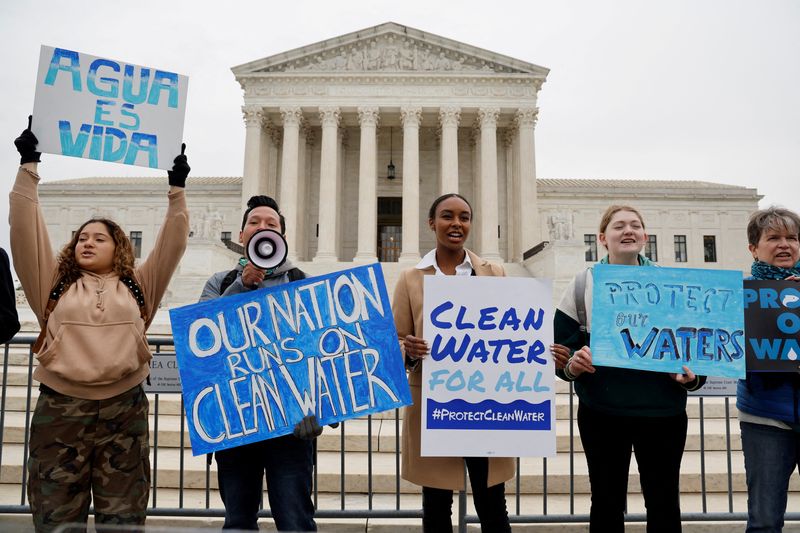By Nate Raymond and Andrew Chung
WASHINGTON (Reuters) - Conservative U.S. Supreme Court justices on Monday appeared open to limiting the reach of the U.S. Environmental Protection Agency's authority to protect wetlands from pollution under a landmark environmental law in a case involving Idaho property owners seeking to build a home.
The court, which has a 6-3 conservative majority, heard arguments in the case on the first day of its new term.
The case gives the conservative justices an opportunity to limit the scope of the Clean Water Act. While they seemed to lean toward favoring the plaintiffs, some conservative justices signaled skepticism toward the notion that the EPA under the Clean Water Act could never police wetlands like swamps, marshes and berms that are near but not connected to regulated waters, as a lawyer for the plaintiffs argued.
The justices heard arguments in an appeal by Chantell Sackett and her husband Mike Sackett, who own property in Priest Lake, Idaho where they hoped to build a home, of a lower court ruling favoring the government. The EPA in 2007 determined that the property was part of a wetland and that they were required to obtain a permit under the Clean Water Act before beginning construction, which they had failed to do. They then sued.
It was the first case heard by the court's newest member, President Joe Biden's appointee Ketanji Brown Jackson, who asked questions and, as she said, wanted to "try to bring some enlightenment" to the question of what Congress intended in the Clean Water Act.
In a 6-3 ruling in June powered by the conservative majority, the court imposed limits on the EPA's authority to issue sweeping regulations involving greenhouse gas emissions from existing coal- and gas-fired power plants under a different environmental law, the Clean Air Act.
At issue in the case heard on Monday is what test courts should use to ascertain what constitutes "waters of the United States" under the 1972 law - a "cryptic phrase, a strange phrase," in the view of conservative Justice Samuel Alito.
The answer will help determine whether wetlands adjacent to navigable waters fall within the EPA's purview, which would subject the property to regulation and force owners to obtain federal permits to carry out construction.
The Clean Water Act does not specify how close a wetland would need to be to navigable waters to fall under the EPA's authority, a vagueness that prompted concern from conservative justices who noted that violations could result in civil and criminal penalties.
"If the federal government doesn't know, how is a person subject to criminal time in federal prison supposed to know?" Justice Neil Gorsuch asked.
Damien Schiff, a lawyer for the Sacketts, argued that his clients could not know - and that the justices should adopt a test for determining when wetlands fall under the EPA's oversight that counts only those that have a continuous surface-water connection to navigable waters.
Conservative Justice Brett Kavanaugh noted that the EPA under Democratic and Republican presidents has for decades agreed that some wetlands that are merely adjacent to regulated waters, like berms and dams, count.
"Why did seven straight administrations not agree with you?" Kavanaugh asked Schiff.
Jackson, in questions that aligned her with fellow liberal Justices Elena Kagan and Sonia Sotomayor, questioned how the Sacketts' arguments matched up with what Congress intended when it passed the law.
"Why would Congress draw the coverage line between abutting wetlands and neighboring wetlands when the objective of the statute is to ensure the chemical, physical and biological integrity of the nation's waters?" Jackson asked.
The property the Sacketts bought in 2004 is about 300 feet (90 meters) from Priest Lake, situated near the U.S.-Canada border.
They filled in the area with gravel and sand after purchasing the property.
Their case reached the Supreme Court once before, with the justices ruling in 2012 that the couple could challenge in court an EPA compliance order imposing financial penalties until they restore the affected land. The EPA has since dropped its compliance order for the Sacketts but still has sought to require a permit.
A ruling is due by the end of June.
